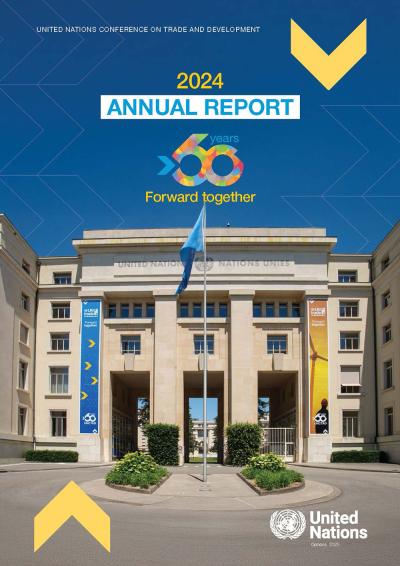
2024 marked UN Trade and Development’s 60th anniversary. Six decades ago, our founders envisioned an institution that would ensure the fruits of globalization would be shared by all. Today, this vision remains our guide, even as the global landscape grows more complex.
The past year was defined by persistent global challenges: Sluggish economic growth, mounting debt distress, retreating investment flows, escalating conflicts and climate emergencies that continue to disproportionately affect developing nations. Trade disruptions in vital maritime corridors – from the Black Sea to the Red Sea and the Panama Canal – threatened food security and exacerbated supply chain fragility. The increasingly contested nature of global trade signaled risks of fragmentation ahead, even as global trade itself grew at a robust pace, with trade in services in the lead.
Against this backdrop, our 60th anniversary celebrations in Geneva provided a moment not just of reflection but of reinvigoration with UN Trade and Development (UNCTAD) showing a new face thanks to the culmination of a rebranding exercise. The presence of heads of state, government representatives and ministers from across the globe demonstrated the continued relevance of our mandate and our institution. More importantly, it offered a platform to articulate a renewed vision for the future – one that acknowledges today's multipolar reality while championing strengthened multilateralism.
Our research and analysis continued to illuminate critical issues, with our flagship reports offering incisive perspectives on everything from maritime chokepoints to the environmental footprint of the digital transition, from rethinking development in the age of discontent to the role of digital governance in investment promotion, from carbon markets in least developed countries to Africa’s regional integration and the growing importance of South-South trade. Our work on critical minerals, the blue and green economies and the digital transformation has positioned us at the forefront of emerging development frontiers and their potential for structural transformation, productive diversification and sustainable development. Our continued momentum in growing readership and media citations are a testament to that.
Our capacity to respond to disruptions in global markets was tested and strengthened throughout the year. Our monitoring of maritime trade routes provided vital real-time data to the international community, while our analysis of nearshoring and friendshoring trends helped countries understand and navigate shifting trade patterns. While our updates on global debt levels, financing for development and sustainable investments showed the urgency of systemic reforms to the global financial architecture – one that recognizes both the limitations of existing instruments and the transformative potential of innovative funding mechanisms in an era of compounding global shocks.
In technical cooperation, we expanded our reach and impact, with particular emphasis on supporting the structural transformation needs of Africa, least developed countries, landlocked developing cuntries and small island developing states. Our programmes in customs automation, debt management, investment capacity building and trade facilitation have equipped developing countries with essential tools to navigate an increasingly complex global economy. Meanwhile, our efforts to integrate a gender and women’s empowerment perspective across all areas of our work have gained momentum, supported by a more coordinated institutional approach. In this effort, our institution received important recognition from the United Nations system.
Furthermore, the intergovernmental machinery continued to evolve, with enhanced participation and engagement from member states. This year saw intensive preparations for UNCTAD16 – the organization’s 16th quadrennial conference, shaping the substantial agenda for 2025. Our contributions to global forums – from COP29 meetings to the G20 (whose summit we attended for the first time in our history), to the Summit of the Future, to the preparatory meetings of the 4th International Conference on Financing for Development (FfD4) – ensured that the development perspective remained at the heart of international economic deliberations.
The year ahead demands our fullest commitment to our mandate. Developing countries face a formidable array of challenges, from debt sustainability and declining fiscal space to trade disruption and technological transformation. Yet they also possess unprecedented capacities for innovation, cooperation and leadership. UNCTAD's task is to strengthen these capacities through policy analysis, technical cooperation and consensus-building.
Looking forward to UNCTAD16, we remain guided by the principle that first animated our founding, that trade and development must work for all peoples, and nations big and small. 60 years on, this principle has lost none of its urgency or relevance. The tools and approaches may evolve, but the mission endures.

Secretary-General
UN Trade and Development (UNCTAD)


